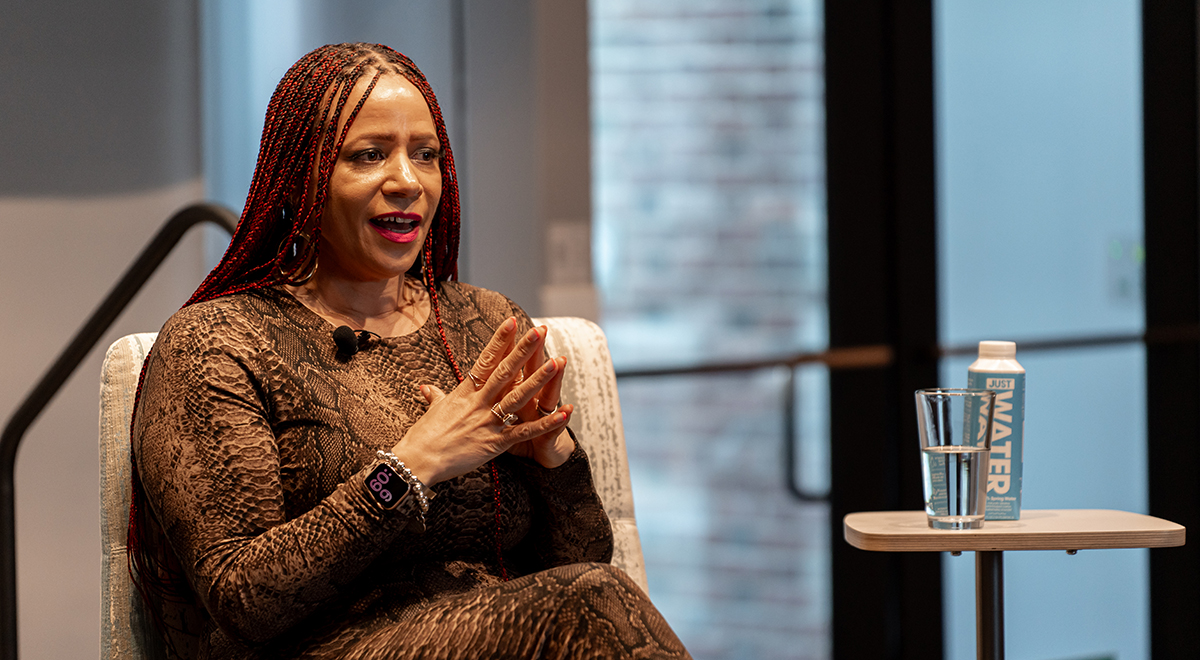No Democracy Without Slavery: A Revolutionary Conversation with Nikole Hannah-Jones

Journalists have always played a vital role in defending democracy, educating the public while holding those in power accountable for their actions. Few journalists have challenged Americans to reimagine who we are as a nation as much as Nikole Hannah-Jones.
On April 25, the Allbritton Center for the Study of Public Life co-sponsored an event with Wesleyan’s Democracy 2024 initiative to host Hannah-Jones, a New York Times correspondent, Knight Chair in Race and Journalism at Howard University, and the Pulitzer Prize–winning creator of the 1619 Project. Corwin-Fuller Professor of Film Studies Tracy Heather Strain sat down with Hannah-Jones to discuss the genesis of the 1619 Project, the public’s response, and how who is telling the story is as important as the story itself.
“The entire point of the 1619 Project is to force a reckoning and acknowledgement, not just for cathartic reasons, but to move us to a point of actually paying the debt that’s owed to the descendants of slavery,” Hannah-Jones said.
That debt doesn’t end with the trauma of human enslavement. It needs to also acknowledge the complicated legacy that has shaped America as a country and that is inseparable from our national narrative. In 2019 Hannah-Jones pitched the project to her editor at The New York Times, Jake Silverstein ’98, because she knew that few people were taught the full story of slavery’s legacy in America. She also refused to let the 400-year milestone pass by without using her platform at one of the largest newspapers in the country to educate readers. Hannah-Jones included as many writers that descended from people who were enslaved on American soil as she could find to contribute to the long-form series. “I knew that we had to be the ones who are largely responsible for telling this story.”

As the public’s response to the 1619 Project issue of New York Times Magazine swelled, media outlets approached Hannah-Jones with various opportunities, including a multi-year development deal with Lionsgate, Oprah Winfrey, and Hulu to produce a variety of 1619 content—books, podcasts, curriculums—and the 1619 Project documentary series.
Again, she advocated for Black creators—those descended from enslaved Americans—to tell this story. “In all the projects I do, it’s important for me to make space for other Black folks and to ensure that they make money, that they’re getting resume builders off of any of the work that we’re producing around the legacy of slavery.” The series was produced by One Story, a Brooklyn-based, Black-owned production company, and Oscar-winning director Roger Ross Williams.
In the same year she won the Pulitzer Prize for Commentary for her introductory essay in the 1619 Project, Hannah-Jones was working toward tenure at her alma mater, University of North Carolina, Chapel Hill. Though the university faculty had voted in her favor, the final vote stalled before UNC’s board of trustees and the controversy made national headlines. “I’d just won the Pulitzer Prize and suddenly I was not good enough to teach 18-year-olds journalism at UNC,” Hannah-Jones said.
While UNC students protested the board’s decision on campus, Hannah-Jones waited and planned her next move. “I knew in that moment I had power. I had to do more than secure a position for myself. I had to send a message that one, [Black women are] tired of begging for crumbs. We’re tired of being treated like we should be grateful to be where we are, as if we don’t bring something amazing.”
Taking control of the narrative, Hannah-Jones went on Gayle King’s talk show to announce she had accepted the Knight Chair position—at Howard University. She had also raised $25 million to create the Center for Journalism & Democracy at the HBCU, which stands for historically Black college or university. “We now have a consortium of eight historically Black colleges. We are building their newsrooms with technology grants. We are paying their students to work in newsrooms. We’re starting investigative reporting classes on those campuses for the first time. We are trying to do the most good.”
Hannah-Jones is still using her power to force Americans to confront the uncomfortable truth within our society. Following the Supreme Court’s decision to overturn affirmative action in the college admissions process, Hannah-Jones penned a New York Times article on the dangerous strategy at the heart of “colorblind” policies. “I knew that [affirmative action] ruling was going to be used against every other racial justice program that might help Black people gain equality. That’s exactly what’s happened. Everything from scholarships to fellowships to small business administration,” she said. Hannah-Jones pointed out that a similar, long-term strategy was used by racists during the Civil Rights Movement. “You can’t have democracy that actually requires constant repression,” she said. “We’d better wake up because we’re not going to have democracy if we allow this to happen.”

